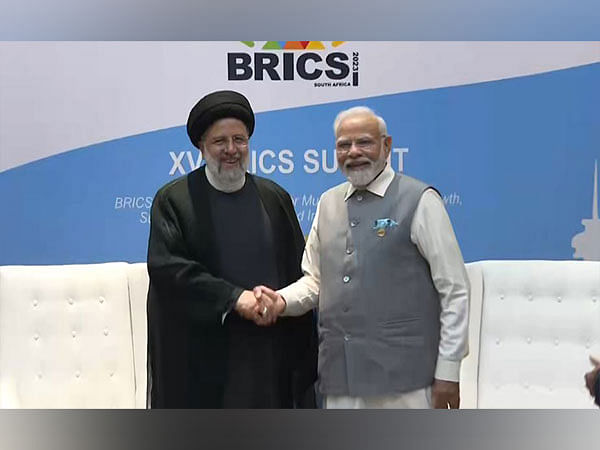


Prime Minister Narendra Modi's two-day visit to Russia for the BRICS Summit 2024 has kicked off with several bilateral summits discussing key issues such as India-Russia ties, the war in Ukraine, and conflicts with Iran and Israel. The summit, with the theme of 'Strengthening Multilateralism,' will see discussions on global issues and includes new member nations - Iran, Egypt, Ethiopia, and the United Arab Emirates. As major emerging economies, the BRICS group comprises 41% of the world population and 24% of the world GDP, making it an important platform for discussions on global development and security.
BRICS: A Global Force for Collaboration and Development
The BRICS group, comprising Brazil, Russia, India, China, and South Africa, is an influential intergovernmental forum that has gained significant prominence in recent years. The acronym "BRICS" was first coined by Jim O'Neill, a former Goldman Sachs economist, in 2001, who recognized the potential of these emerging economies to reshape the global economic landscape.
Initially, the BRICS group consisted of Brazil, Russia, India, and China. South Africa joined in 2010, expanding the forum's reach and influence. The BRICS countries share a common goal of fostering economic growth, promoting international cooperation, and reforming global economic institutions to reflect the changing world order.
BRICS Summit 2024 and India's Role
The BRICS Summit 2024, held in Moscow, Russia, is set to be a significant event in the history of the group. With the theme "Strengthening Multilateralism," the summit will focus on key global issues such as sustainable development, climate change, international trade, and security.
Prime Minister Narendra Modi's participation in the summit highlights India's growing role within BRICS. India has been an active member of the group, contributing to discussions on various issues and leading initiatives in areas such as infrastructure development and financial inclusion. India's engagement with BRICS is expected to further strengthen its position as a global economic and diplomatic power.
BRICS: A Platform for Global Governance
As a major emerging economies, the BRICS countries represent a large portion of the world population and contribute significantly to global economic growth. The group provides a platform for these countries to coordinate their policies, pool their resources, and work together to address common challenges.
BRICS has established several mechanisms to promote cooperation, including the BRICS New Development Bank, the BRICS Business Council, and the BRICS Parliamentary Forum. These institutions facilitate economic, financial, and political dialogue among the member countries, helping them to shape the global agenda and contribute to a more equitable and sustainable world order.
Top 5 FAQs and Answers
1. What is the significance of the BRICS group? BRICS is an important platform for emerging economies to collaborate on global economic and political issues, fostering economic growth, promoting international cooperation, and reforming global economic institutions.
2. What are the key objectives of the BRICS Summit 2024? The summit aims to strengthen multilateralism, address global issues such as sustainable development, climate change, international trade, and security, and discuss the expansion of BRICS membership.
3. What is India's role within BRICS? India is an active member of BRICS, contributing to discussions and leading initiatives in areas such as infrastructure development and financial inclusion. India's engagement with BRICS strengthens its position as a global economic and diplomatic power.
4. What are the mechanisms established by BRICS to promote cooperation? BRICS has established the BRICS New Development Bank, the BRICS Business Council, and the BRICS Parliamentary Forum to facilitate economic, financial, and political dialogue among the member countries.
5. What is the potential impact of BRICS on the global economy? The BRICS countries represent a significant portion of the world population and contribute substantially to global economic growth. BRICS' cooperation and coordination can influence global economic policies, trade patterns, and the development of international financial institutions.

Security agencies in India are growing increasingly concerned about the Islamic State's latest recruitment strategy. Instead of focusing on immediate attacks, the outfit is now heavily concentrating on infiltrating South India through recruitment and ideological indoctrination. Using tactics such as setting up Arabic schools and madrasas disguised as recruitment camps, IS is targeting individuals who went underground following the ban on the Popular Front of India, taking advantage of groundwork previously laid by this organization. This phased radicalization process involves initial contact through advertisements for Arabic classes, transitioning to online platforms, and ultimately indoctrinating students through live and pre-recorded sessions.

On Sunday, a mass shooting took place at a Jewish Hanukkah celebration on Sydney's Bondi Beach, resulting in the deaths of at least 10 people. While authorities have not yet confirmed a terror angle, an intelligence assessment by CNN-News18 suggests that the attack will be closely examined as it targeted a symbolic and highly visible religious event. Sources also indicate that the attack may have been pre-planned and potentially motivated by extremist ideologies. Australian authorities are currently investigating the incident for further details and potential connections to online extremist narratives.

A lone ISIS gunman ambushed a group of US service members and civilians in Syria, killing two and injuring three. The gunman was eventually killed by partner forces, confirmed by the US Defence Secretary. This is the first attack on US troops in Syria since the fall of President Bashar al-Assad. The casualties were transported to a nearby garrison and their identities will be withheld until their next of kin have been notified.

Pakistan's Prime Minister, Shehbaz Sharif, caused a major stir in Turkmenistan when he decided to gate-crash a meeting between Russian President Vladimir Putin and Turkish President Recep Tayyip Erdogan after waiting for 40 minutes. This impulsive move showcases Pakistan's increasing diplomatic insecurity and diminishing geopolitical clout. As Sharif struggles to secure meaningful engagements with major powers, he also faces domestic crises and is under the control of Army Chief Asim Munir. Meanwhile, the event in Turkmenistan marked a milestone for the country's declaration of neutrality and its efforts to maintain independence from both Western and Russian influence.

During an international forum in Turkmenistan, Pakistan's Prime Minister Shehbaz Sharif faced an embarrassing diplomatic moment as he walked into a private meeting between Russian President Vladimir Putin and Turkish President Recep Tayyip Erdogan. Sharif had been waiting for over 40 minutes for his scheduled meeting with Putin, causing him to enter the ongoing conversation between the two leaders. The incident, captured on video and shared by RT India, has triggered widespread mockery on social media with users making jokes about Sharif's actions. This comes as Pakistan attempts to strengthen its ties with Russia, while Putin maintains a closer relationship with India.

The latest bout of border fighting between Thailand and Cambodia has escalated, with hundreds of thousands of civilians displaced and casualties on both sides. The renewed skirmishes have shattered a ceasefire proposed by U.S. President Donald Trump in July. The leaders of both countries have promised to continue their aggressive stance, causing further tension and concerns for the safety of civilians. This has even resulted in the withdrawal of Cambodia's team from a regional sporting event.

Notorious Naxalite commander Ramdher Majji, along with his group, surrendered to the police in Chhattisgarh. This surrender marks a milestone in the fight against Naxalism, as the state's Deputy Chief Minister states that 80 percent of the menace has been eradicated. With the government's resolved aim to eliminate Naxalism by 2026, the country is heading towards a permanent solution to this long-standing issue. Home Minister Amit Shah also noted the significant progress made in reducing Naxal violence, with only 10 percent of the nation's population currently affected compared to 120 million people in the past.

After the tragic fire at their club in Goa, owners Gaurav and Saurabh Luthra have been detained in Thailand and are expected to be brought back to India soon. The Indian agencies have been in constant communication with Thai authorities and have managed to locate the brothers outside the main city area. With their detention, the process for their deportation has been initiated and Indian agencies are coordinating with Thai authorities for their return. The article also explains the general procedure for deportation of foreigners from Thailand under immigration laws.

Two years after the shocking death of Dawn Sturgess from Novichok poisoning, a public inquiry has released its final report. The report, overseen by retired Supreme Court justice Lord Hughes of Ombersley, examined whether British officials had taken adequate precautions to prevent the attack on ex-spy Sergei Skripal and his daughter Yulia in March 2018. The inquiry also investigated whether Ms. Sturgess's death could have been avoided with timely public warnings about abandoned objects. Good Morning Britain correspondent Richard Gaisford reported live from Salisbury, where the attack first came to light, to reveal the disturbing findings of the inquiry.

The Indian Air Force (IAF) has found a solution to maintain its aging Jaguar fleet by obtaining over 20 retired aircraft from the Oman Air Force. These jets will be dismantled and used as spares, as global production of Jaguar has ceased. With this transfer, India will become one of the few countries to still operate the Anglo-French supersonic attack aircraft. The collaboration between India and Oman in this regard reflects their robust defense partnership.